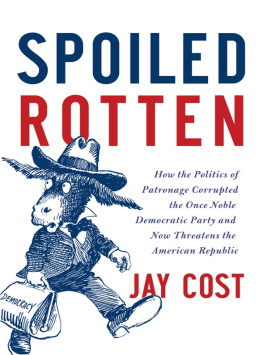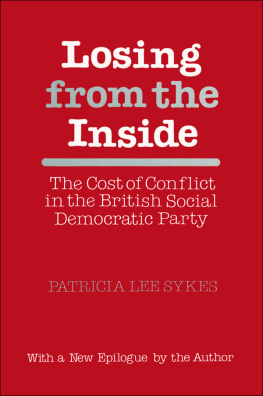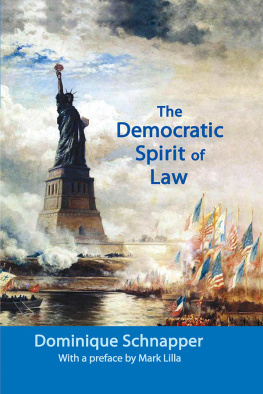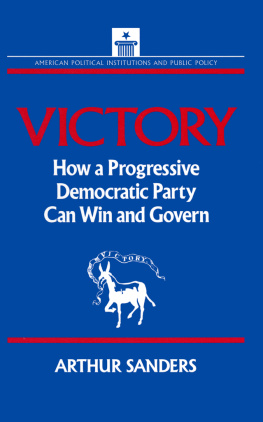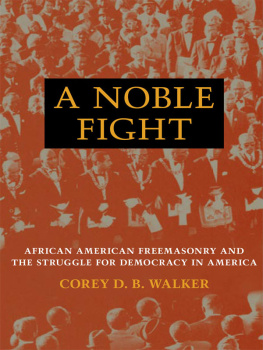The great desideratum in Government is such a modification of the Sovereignty as will render it sufficiently neutral between the different interests and factions, to controul one part of the Society from invading the rights of another, and at the same time sufficiently controuled itself, from setting up an interest adverse to that of the whole Society.
JAMES MADISON, Vices of the Political System of the United States
There are no necessary evils in government. Its evils exist only in its abuses. If it would confine itself to equal protection, and, as Heaven does its rains, shower its favors alike on the high and the low, the rich and the poor, it would be an unqualified blessing.
ANDREW JACKSON, Veto Message, July 10, 1832
[Speaker of the House Nancy Pelosi] tracked down Rep. Jim Cooper (D-Tenn.) in a Tennessee airport, returning to Washington for the final week.... The store is open, Cooper recalled Pelosi telling him. Were crafting the managers amendment. Now is the time to get your provisions.
CECI CONNOLLY, Landmark: The Inside Story of Americas New Health-Care Law and What It Means for Us All
I t wasnt supposed to be like this.
Barack Obama entered the White House in January 2009 with all signs pointing toward major liberal policy reforms. He had campaigned unabashedly as a reformer, promising change we can believe in, and won the largest popular-vote majority of any Democrat in more than forty years. He had an outsize congressional majority in both chambers, dominated by the kinds of northern Democrats who had long been the prime movers of liberal reform. The Republican opposition was seemingly discredited, taking the blame for a terrible economy as well as a congressional faction of so-called conservatives who had spent money like drunken sailors during their years in the majority. To top it all off, his job approval upon entering office was nearly 70 percent, higher than that of any incoming president in decades.
Within twenty months it was all over. In November 2010 the country elected more Republicans to the House of Representatives than in any election since the 1940s. President Obamas job approval had fallen below 50 percent, and his rating among the all-important group of independent voters who swing elections had dropped into the danger zone of the low forties. The new Republican majority in the House promised a return to the partys role as a responsible steward of the economy and the federal budget, and the reform era of the Obama administration was well and truly finished.
How could this have happened? Sure, some of it can be chalked up to the midterm bluesthe sitting party of the president almost always loses seats in off-year elections. Some of it can be chalked up to the weak economytwenty months into his administration, President Obama had to share at least some of the blame with George W. Bush. Yet the breadth and depth of Democratic losses in November 2010with a net of sixty-two House seats flipping from blue to red, most of which came in the Midwest and the Southsuggested that something more was at play.
That something was symbolized by the Patient Protection and Affordable Care Act (PPACA), which represented for liberal Democrats the culmination of nearly a century of struggle. Harry Truman included universal health care reform in his Fair Deal package in the 1940s. Before that, Teddy Roosevelts Progressive party, dominated by future New Dealers like Harold Ickes, called for a national health service in 1912. No wonder Obama and the Democratic leadership in Congress wanted to use their outsize majority to remake the nations health care system.
But health care reform turned out to be the Democratic partys undoing. Almost as soon as the legislative process began, moderate Democrats from the South and Midwest started bolting, finally forcing a showdown between Blue Dogs and liberal chairman Henry Waxman in the House Energy and Commerce Committee in the summer of 2009. Meanwhile, Obamas job approval plummeted nearly 20 points in just seven months, and by August it stood at an anemic 50 percent in the Gallup poll. By that point, poll after poll found a plurality, if not an outright majority, of Americans disapproving of the Democratic health care plan. Of course, the Democrats did not stop there. Despite mounting public pressure, evidenced by a Republican victory in the battle to fill the seat left behind by the late Ted Kennedy, Democrats pushed forward with the bill, finally passing it in the spring of 2010 via an unprecedented legislative sleight of hand. Public opinion by that point had completely soured and was never to sweeten again on Obamacare.
Democrats blamed the collapse of the publics support for reform on Republican smear tactics, while Republicans blamed it on Americans distaste for big government. Neither answer makes much sense. By the middle of 2009, Republican had become the political equivalent of a four-letter wordhardly anybody trusted the Republican party enough to believe its claims about the health care bill. Whats more, Obama occupied the bully pulpit, the most effective tool for communicating to the mass public, while the Republicans struggled to get any media attention for their message. As for the mass publics supposed dislike of big government, how does one account for the enduring popularity of Medicare, which is socialized medicine if anything is? Furthermore, Americans overwhelmingly approved of many specific items within the legislation, in particular tougher regulations on the insurance companies, which are not held in high esteem.
The real problem with the health reform efforts was the controversial manner by which it was passed. Rather than propose a bill to Congress, President Obama allowed the legislature to draft health care reform basically from scratch, and the result was a political disaster. Dozens upon dozens of stakeholders (the buzzword the Obama administration used for special-interest groups aligned with the Democratic party) emerged out of nowhere to demand this exceptional consideration or that particular carve-out. The line of groups demanding to wet their beaks seemed endless: big businesses, labor unions, liberal activist groups, medical groups representing doctors, nurses, drug companies, and so on. And of course, wavering legislators were able to extract significant concessions, the most infamous of which was Nebraska senator Ben Nelsons Cornhusker Kickback that exempted only Nebraska from having to pay additional costs for the expanded Medicaid rolls. The only ones who did not get a seat at the table were the American people, the supposed beneficiaries of the reform effort.

